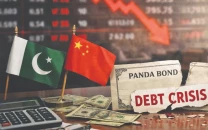Stumbling blocks: Law and order, energy crisis stymie Japanese investment
Companies lie in wait for things to stabilise before making investment.

Japan has particular interest in this region as part of efforts to promote business ties with central Asian states in fields like automobiles and electronics. DESIGN: CREATIVE COMMON
However, a good sign is that still many of them are waiting for things to stabilise to some extent so they could immediately jump-start operations as they believe that Pakistan offers a great potential and is a key to trade with central Asian countries.

Japan has particular interest in this region as part of efforts to promote business ties with central Asian states in fields like automobiles and electronics, but it is worried about security issues and power and gas crisis. It needs better environment and infrastructure. In fact, expansion plans of some companies have been put on the back burner.
“Japanese companies are interested in investing in Pakistan, but persistent problems are not allowing them to do so,” said Toshikazu Isomura, Counsellor at Japanese Embassy, while talking to The Express Tribune.
“We know that central Asian markets offer a huge potential for us, we are waiting for things to normalise, especially law and order and energy crisis. We are pinning our hopes on this government as it is taking every possible measure to tackle these issues but there is still a long journey ahead,” he said.

Japan declared Pakistan as a country that was “fit for business” when its delegation of investors under the auspices of Japan External Trade Organization (Jetro) visited Islamabad a year ago.
They expressed interest in increasing supply of auto accessories, supply chain and technology transfer, especially to the automobile sector of Pakistan, for gaining access to Central Asia.
They were also eyeing some other segments, particularly retail sector and logistics. However, since they left, no major breakthrough had been made, except for the re-entry of Yamaha.
Fresh investment is coming from Yamaha, which will soon start assembling motorcycles at the Port Qasim after a gap of almost a decade. Japan needs countries like Pakistan to set up production facilities as manufacturing back home has become too costly, regardless of the segment.
“Things are at halt for Japanese companies, there is no proper land route to Afghanistan and other countries from Pakistan, how can we export automobile accessories,” he asked. “Gwadar is the key, but still there is no facility over there.”
Isomura said Japan was still assisting Pakistan government in various projects, of which increasing the turbine capacity of Mangla power station was a significant venture.
In reply to a question about Chinese investment in Pakistan, he said companies investing and operating in any segment in Pakistan were state-owned corporations. “In our case, we only encourage private companies to invest. This is our model and we are committed to this,” he added.
Published in The Express Tribune, October 24th, 2013.
Like Business on Facebook, follow @TribuneBiz on Twitter to stay informed and join in the conversation.



















COMMENTS
Comments are moderated and generally will be posted if they are on-topic and not abusive.
For more information, please see our Comments FAQ